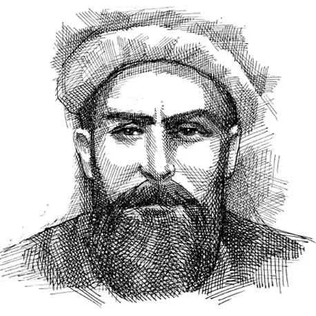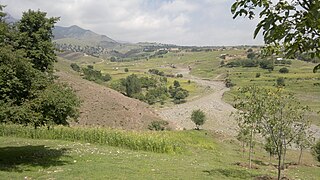Waziristan is a mountainous region of Pakistani province of Khyber Pakhtunkhwa. The Waziristan region administratively splits among three districts: North Waziristan, Lower South Waziristan District, and Upper South Waziristan District. Waziristan region, consisted of three districts, covers around 11,585 square kilometres (4,500 sq mi) and is mainly populated by the Mehsud, The Wolves, & Wazir Pashtun tribe, who speak the Waziri dialect of the Pashto language.

North Waziristan District is a district of Khyber Pakhtunkhwa province in Pakistan. It is the northern part of Waziristan, a mountainous region of northwest Pakistan, bordering Afghanistan and covering 4,707 square kilometres (1,817 sq mi). The capital city of North Waziristan is Miranshah.

The North-West Frontier was a region of the British Indian Empire. It remains the western frontier of present-day Pakistan, extending from the Pamir Knot in the north to the Koh-i-Malik Siah in the west, and separating the modern Pakistani frontier regions of North-West Frontier Province, Federally Administered Tribal Areas and Balochistan from neighbouring Afghanistan in the west. The borderline between is officially known as the Durand Line and divides Pashtun inhabitants of these provinces from Pashtuns in eastern Afghanistan.

South Waziristan District was a district in the Dera Ismail Khan Division of the Khyber Pakhtunkhwa province of Pakistan, before splitting into the Lower South Waziristan District and the Upper South Waziristan District on 13 April 2022. It covers around 11,585 km2 (4,473 mi2). Waziristan is located in the southwest of Khyber Pakhtunkhwa. It is situated between two rivers, the Tochi River to the north and the Gomal River to the south. The region was an independent tribal territory from 1893, separated from both Afghanistan and the British-ruled empire in the subcontinent. Raiding the tribal areas was a constant problem for the British, requiring frequent punitive expeditions between 1860 and 1945. Troops of the British Raj coined a name for this region "Hell's Door Knocker" in recognition of the fearsome reputation of the local fighters and inhospitable terrain. The district headquarter of the South Waziristan district is Wanna. South Waziristan is divided into three administrative subdivisions of Ladha, Sarwakai, and Wanna. These three subdivisions are further divided into eight Tehsils: Ladha, Makin, Sararogha, Sarwakai, Tiarza, Wanna, Barmal, and Toi Khula.
Haji Mirzali Khan Wazir, commonly known as the Faqir of Ipi, was a tribal chief and adversary to the British Raj from North Waziristan in what is now Khyber Pakhtunkhwa, Pakistan.

The Mahsud or Maseed is a Karlani Pashtun tribe inhabiting mostly the South Waziristan Agency in Khyber Pakhtunkhwa province of Pakistan.

Cadet College Razmak is a military high school, located in the valley of Razmak, in North Waziristan, Federally Administered Tribal Areas (FATA), Pakistan.

The Indian General Service Medal was a campaign medal approved on 1 January 1909, for issue to officers and men of the British and Indian armies. From 1919, it was also awarded to officers and men of the Royal Air Force, with the Waziristan 1925 clasp awarded solely to the RAF.

Mulla Powinda or Mullah Powindah, born Mohiuddin Maseed (1863–1913), was a religious leader and a freedom fighter from the Pashtun tribe of the Shabi khel Mahsuds, based in Waziristan. He was from Marobi Shabikhel, a village in the present-day Makin Subdivision of South Waziristan. He led a long-standing guerrilla insurgency against the British colonial forces in the late 19th century. And came to prominence by getting the two elders of the Jirga, who were responsible for handing over two Mahsuds wanted by the British authorities for killing a British officer of the Works department. to the Political Agent in 1893.
The Shawal Rifles is a paramilitary regiment, forming part of the Pakistani Frontier Corps Khyber Pakhtunkhwa (North). The Rifles are tasked with defending the border with Afghanistan and assisting with law enforcement in the districts adjacent to the border. The regiment had a 2020/21 budget of Rs. 1.85 billion.
Donald Powell Distinguished Service Order was an officer in the British Indian Army during World War I and World War II

Razmak is one of the three subdivisions of North Waziristan District in Pakistan, the other two being Mir Ali and Miran Shah. The inhabitants are almost exclusively Wazir Pashtuns, along with a few from the Mahsud tribe. The town of Razmak is located just north of Makeen, South Waziristan.
The Waziristan campaign 1936–1939 comprised a number of operations conducted in Waziristan by the British Indian Army against the fiercely independent tribesmen that inhabited this region. These operations were conducted in 1936–1939, when operations were undertaken against followers of the Pashtun nationalist Mirzali Khan, also known by the British as the "Faqir of Ipi", a religious and political agitator who was spreading anti-British sentiment in the region and undermining the prestige of the Indian government in Waziristan at the time.
Hafiz Gul Bahadur is the leader of a Pakistani Taliban faction known as the Gul Bahadur Network (HGB) based in North Waziristan and surrounding districts of the former FATA region in northwestern Pakistan. Upon the formation of the Tehrik-i-Taliban Pakistan (TTP) in December 2007, he was announced as the militant group's overall naib amir under Baitullah Mehsud, who was based in South Waziristan, but has largely distanced himself from the TTP due to rivalries with Mehsud and disagreements about the TTP's attacks against the Pakistani state. Following the Fall of Kabul (2021), the Gul Bahadur Network’s ties to the Haqqani Network and TTP have significantly improved, resulting in a sharp increase in cross border militant incursions along the Pakistan-Afghanistan international border.

The Waziristan campaign 1919–1920 was a military campaign conducted in Waziristan by British and Indian forces against the fiercely independent tribesmen that inhabited this region. These operations were conducted in 1919–1920, following the unrest that arose in the aftermath of the Third Anglo-Afghan War.
The 2014 Bannu Bombing was a bombing attack by the Taliban that killed twenty six Pakistani soldiers. Thirty-eight other people were injured as a result of the bombing.

Lieutenant Colonel Sir Arthur John Dring was the second Prime Minister of the princely state of Bahawalpur. He was also the senior member of the Indian Political Service in the last decades of the British Raj, Assistant Private Secretary to the Governor-General of India and an advisor to governments on plebiscites for two former British colonies in Africa. Dring Stadium, the site of the second test cricket match of the India-Pakistan test series in 1955, is named after him. He was called John throughout his life.

Razmak Tehsil is a subdivision located in North Waziristan district, Khyber Pakhtunkhwa, Pakistan. The population is 17,629 according to the 2017 census.

The Waziristan campaign was a road construction effort and military campaign conducted from 21 December 1921 to 31 March 1924 by British and Indian forces in Waziristan. These operations were part of the new Forward Policy, which sought to reduce and eventually eliminate tribal uprisings and tribal raids into settled districts by stationing regular troops inside Waziristan, which would then be capable of swiftly responding to Waziri rebellions. The rebel tribes attempted to harass the British troops, but were unsuccessful in stopping the British road construction efforts. Hugh Beattie provided a detailed account of the conflict in chapter 7 of Empire and Tribe in the Afghan Frontier Region: Custom, Conflict and British Strategy in Waziristan until 1947.

Waziristan rebellion was a rebellion by the Pashtun leader Faqir of Ipi to secede from Pakistan and establish a separate Pashtun state of Pashtunistan.













